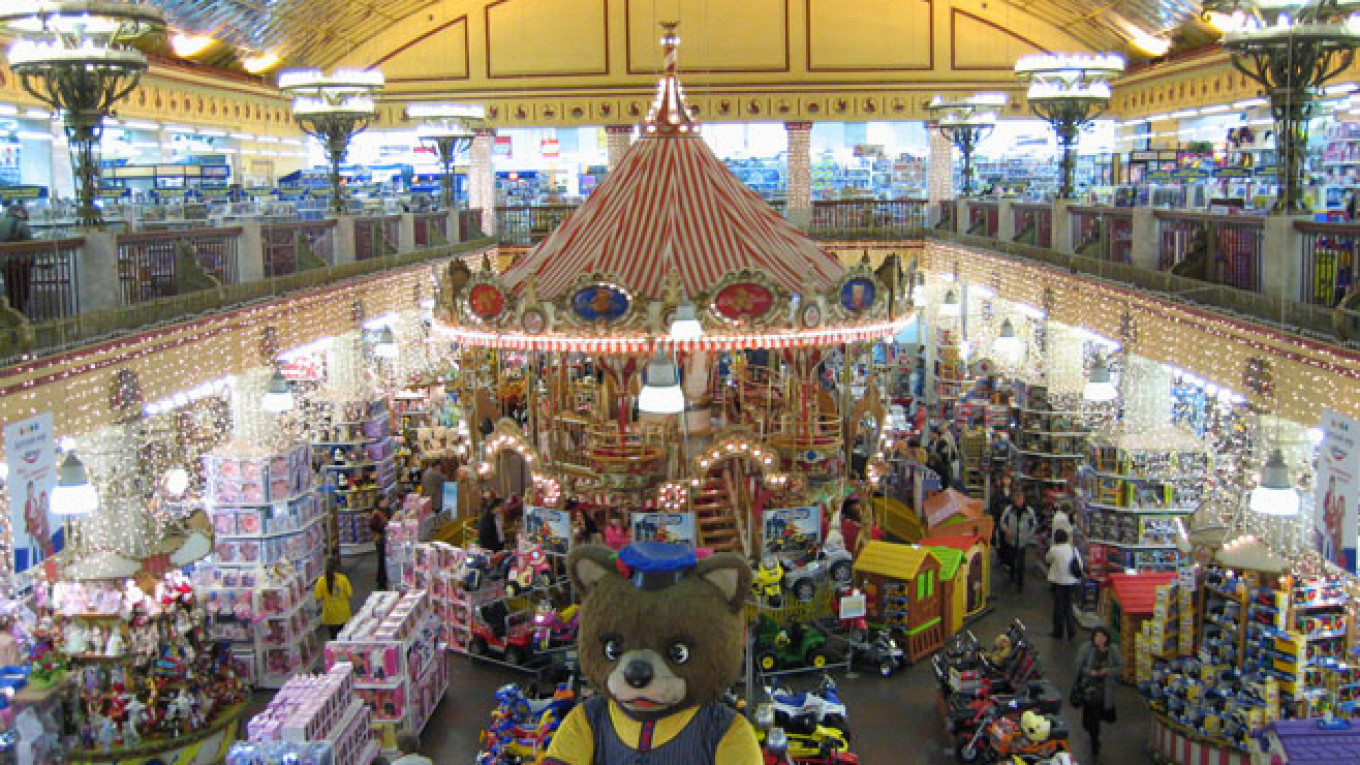The Soviet Union's biggest toy store reopened to a new generation of children on Tuesday with a burst of ceremonial pomp and patriotic fervor.
With more than 100 stores spread over 73,000 square meters and seven stories, the Central Children's Store — really a shopping mall centered on the theme of childhood — is the biggest complex of children's stores in the world, according to Hals-Development, the subsidiary of state banking group VTB that transformed the building's interior.
See the Photo Gallery: Soviet-Era Detsky Mir Reopens
The mall also reportedly boasts the biggest clock in the world, whose 5 tons of metal solemnly launched into motion on Tuesday before an audience of more than 1,000 people, among them Moscow Mayor Sergei Sobyanin.
A project of Soviet architect Alexei Dushkin, who also designed several well-known Moscow metro stations, the store was opened in 1957 under the name Detsky Mir, or Children's World.
According to Natalya Dushkina, a professor at the Moscow Institute of Architecture who is also Dushkin's granddaughter, the building had clear symbolic value.
"It was a symbol in a country that had lost a huge number of people during [World War II], and of course the meaning of this building is that children, many children must be here," Dushkina said.
For a generation of Muscovites, Detsky Mir was a cornucopia of high-quality goods at a time when finding the products you needed could be a full-time job.
"[Detsky Mir] had all the best things, the most elegant things. It was difficult to get goods made of natural fur at that time, you couldn't just go into any store and get them. But here you could," said Tamara Mikhailovna, whose middle-aged daughter was opening a cafe on the upper level.
The store came into the possession of banking giant VTB in 2008 and was closed for restoration, the costs of which ultimately totaled about 8 billion rubles ($137 million), according to Hals-Development.
In the process, it lost its former name — which is now owned by the brand Detsky Mir, whose flagship store on Ulitsa Vozdvizhenka is a direct competitor — and was dubbed the Central Children's Store.
But despite harkening back to the building's storied past, the complex's digital recreation areas and foreign brands speak to an altogether different, post-Soviet generation.
The goods are not the only thing that's new. Although Sobyanin in an opening speech praised the developers for restoring "everything that could be," according to Dushkina, the "restoration" — widely criticized by preservationists — was in fact a full-blown reconstruction.
"All the historical interiors have been destroyed, it's a completely different space. It's a handicapped monument," Dushkina said.
Recent political trends were also more than evident at the opening, which featured the kind of heavy-handed patriotism that has flourished in Russia since the annexation of Crimea last year.
A ceremonial light show celebrating the bounty of Russian nature ended with a child's voice crying out over the loudspeakers: "I love Russia! I am proud that we are the largest and most beautiful country in the world."
Amid this clash of the old and new, some looked back wistfully to the warm and busy atmosphere that the old Soviet Detsky Mir is remembered for.
"One wants that coming together of people, to be able to just walk up to someone and talk freely, that atmosphere," said Natalya Mikhailovna, whose cafe had just opened on the seventh floor. "It was like that before. I hope it will come with time."
A Message from The Moscow Times:
Dear readers,
We are facing unprecedented challenges. Russia's Prosecutor General's Office has designated The Moscow Times as an "undesirable" organization, criminalizing our work and putting our staff at risk of prosecution. This follows our earlier unjust labeling as a "foreign agent."
These actions are direct attempts to silence independent journalism in Russia. The authorities claim our work "discredits the decisions of the Russian leadership." We see things differently: we strive to provide accurate, unbiased reporting on Russia.
We, the journalists of The Moscow Times, refuse to be silenced. But to continue our work, we need your help.
Your support, no matter how small, makes a world of difference. If you can, please support us monthly starting from just $2. It's quick to set up, and every contribution makes a significant impact.
By supporting The Moscow Times, you're defending open, independent journalism in the face of repression. Thank you for standing with us.
Remind me later.






